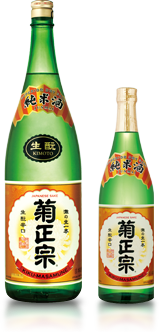Sake Tasting Note
Kiku Masamune Honjozo Sake

The authentically dry Honjozo Sake boasts a refreshing, rich taste that is free of impurities and a clean, crisp finish. Since Kiku Masamune switched to the traditional Kimoto method for brewing it in September 2009, they have refined this exceptional label to perfect a balanced taste and powerful, crisp finish. Kiku Masamune invites you to make this sake your choice at the dining table.
Kiku Masamune Junmai Sake

Unlike most breweries' current practice of adding commercially purchased lactic acid, the Kimoto method is a traditional and painstaking technique for cultivating robust yeast slowly and methodically by tapping the natural biological power of living lactic acid bacteria. Strong yeast cultivated using the Kimoto method continues to actively ferment even as the alcohol content of the sake mash increases toward the end of the fermentation period, creating a refreshingly dry sake with very few impurities.Kiku-Masamune invites you to enjoy the refined taste of this dry Junmai Sake, which is made possible by the Kimoto method.
Kiku Masamune Junmai Ginjo

A sake made with a rice polishing ratio of 60% or less and only rice and malted rice (kome-koji) as ingredients (by contrast, junmai dai-ginjo is made with a rice polishing ratio of 50% or less), resulting in a mellow, balanced, and refreshing savoriness along with a full-bodied, fruity aroma.
Kiku Masamune Junmai Dai Ginjo

Their superbly balanced Junmai Dai-Ginjo is distinguished by slight, soft sweetness and elegant fragrance; a smooth finish; and an understated, mellow aftertaste.
